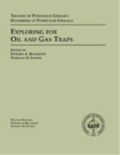Difference between revisions of "Temperature trap regime"
Jump to navigation
Jump to search
(list) |
Cwhitehurst (talk | contribs) m (added Category:Treatise Handbook 3 using HotCat) |
||
| (4 intermediate revisions by 2 users not shown) | |||
| Line 6: | Line 6: | ||
| part = Traps, trap types, and the petroleum system | | part = Traps, trap types, and the petroleum system | ||
| chapter = Classification of exploration traps | | chapter = Classification of exploration traps | ||
| − | | frompg = 2- | + | | frompg = 2-40 |
| − | | topg = 2- | + | | topg = 2-40 |
| author = Richard R. Vincelette, Edward A. Beaumont, Norman H. Foster | | author = Richard R. Vincelette, Edward A. Beaumont, Norman H. Foster | ||
| link = http://archives.datapages.com/data/specpubs/beaumont/ch02/ch02.htm | | link = http://archives.datapages.com/data/specpubs/beaumont/ch02/ch02.htm | ||
| Line 19: | Line 19: | ||
The classes and families of the temperature trap regime are outlined below. | The classes and families of the temperature trap regime are outlined below. | ||
| − | + | {| class = wikitable | |
| − | + | |- | |
| − | + | ! Regime || Class || Family || Subfamily | |
| − | + | |- | |
| − | + | | rowspan = 2 | Temperature traps || [[Gas hydrate]] traps || colspan = 2 | Low-temperature traps; Accumulations in which hydrocarbon gases occur as a solid, ice-like compound of gas and water, formed under conditions of extreme low temperature and high pressure. | |
| − | + | |- | |
| − | + | | Basin-center gas; Accumulations typically found in deep, hot basin centers in which all available pore space is saturated with gas. || High-temperature traps || Generative traps; High temperatures result in [[maturation]] of [[source rock]], which generates and expels sufficient volume of hydrocarbons to saturate pore space of all nearby reservoirs. | |
| − | + | |} | |
| − | |||
==See also== | ==See also== | ||
| Line 41: | Line 40: | ||
[[Category:Traps, trap types, and the petroleum system]] | [[Category:Traps, trap types, and the petroleum system]] | ||
[[Category:Classification of exploration traps]] | [[Category:Classification of exploration traps]] | ||
| + | [[Category:Treatise Handbook 3]] | ||
Latest revision as of 16:31, 13 April 2022
| Exploring for Oil and Gas Traps | |

| |
| Series | Treatise in Petroleum Geology |
|---|---|
| Part | Traps, trap types, and the petroleum system |
| Chapter | Classification of exploration traps |
| Author | Richard R. Vincelette, Edward A. Beaumont, Norman H. Foster |
| Link | Web page |
| Store | AAPG Store |
Temperature traps are those in which trap boundaries are created or controlled by subsurface temperatures. Both low temperatures and high temperatures can create trapping conditions for hydrocarbons.
Classes and families
The classes and families of the temperature trap regime are outlined below.
| Regime | Class | Family | Subfamily |
|---|---|---|---|
| Temperature traps | Gas hydrate traps | Low-temperature traps; Accumulations in which hydrocarbon gases occur as a solid, ice-like compound of gas and water, formed under conditions of extreme low temperature and high pressure. | |
| Basin-center gas; Accumulations typically found in deep, hot basin centers in which all available pore space is saturated with gas. | High-temperature traps | Generative traps; High temperatures result in maturation of source rock, which generates and expels sufficient volume of hydrocarbons to saturate pore space of all nearby reservoirs. | |